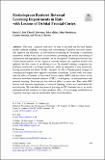Files in this item
Escitalopram restores reversal learning impairments in rats with lesions of orbital frontal cortex
Item metadata
| dc.contributor.author | Tait, David S. | |
| dc.contributor.author | Bowman, Ellen E. | |
| dc.contributor.author | Miller, Silke | |
| dc.contributor.author | Dovlatyan, Mary | |
| dc.contributor.author | Sanchez, Connie | |
| dc.contributor.author | Brown, Verity J. | |
| dc.contributor.editor | Löbner, Sebastian | |
| dc.contributor.editor | Gamerschlag, Thomas | |
| dc.contributor.editor | Kalenscher, Tobias | |
| dc.contributor.editor | Schrenk, Markus | |
| dc.contributor.editor | Zeevat, Henk | |
| dc.date.accessioned | 2021-06-24T09:30:01Z | |
| dc.date.available | 2021-06-24T09:30:01Z | |
| dc.date.issued | 2021-05-29 | |
| dc.identifier | 274589103 | |
| dc.identifier | df481e6f-63fb-4bd7-b6f8-ee2ba879f79a | |
| dc.identifier | 85107033850 | |
| dc.identifier.citation | Tait , D S , Bowman , E E , Miller , S , Dovlatyan , M , Sanchez , C & Brown , V J 2021 , Escitalopram restores reversal learning impairments in rats with lesions of orbital frontal cortex . in S Löbner , T Gamerschlag , T Kalenscher , M Schrenk & H Zeevat (eds) , Concepts, frames and cascades in semantics, cognition and ontology . Language, cognition and mind , vol. 7 , Springer , Cham , pp. 389-409 . https://doi.org/10.1007/978-3-030-50200-3_18 | en |
| dc.identifier.isbn | 9783030501990 | |
| dc.identifier.isbn | 9783030502027 | |
| dc.identifier.isbn | 9783030502003 | |
| dc.identifier.issn | 2364-4109 | |
| dc.identifier.other | RIS: urn:AD729E446BD9A502E1C96ABF413296F7 | |
| dc.identifier.other | ORCID: /0000-0001-9693-1739/work/95418283 | |
| dc.identifier.other | ORCID: /0000-0001-5762-1797/work/95418327 | |
| dc.identifier.other | ORCID: /0000-0001-5310-7731/work/95418330 | |
| dc.identifier.uri | https://hdl.handle.net/10023/23413 | |
| dc.description | Funding: This study was funded by H. Lundbeck A/S. | en |
| dc.description.abstract | The term ‘cognitive structures’ is used to describe the fact that mental models underlie thinking, reasoning and representing. Cognitive structures generally improve the efficiency of information processing by providing a situational framework within which there are parameters governing the nature and timing of information and appropriate responses can be anticipated. Unanticipated events that violate the parameters of the cognitive structure require the cognitive model to be updated, but this comes at an efficiency cost. In reversal learning a response that had been reinforced is no longer reinforced, while an alternative is now reinforced, having previously not been (A+/B− becomes A−/B+). Unanticipated changes of contingencies require that cognitive structures are updated. In this study, we examined the effect of lesions of the orbital frontal cortex (OFC) and the effects of the selective serotonin reuptake inhibitor (SSRI), escitalopram, on discrimination and reversal learning. Escitalopram was without effect in intact rats. Rats with OFC lesions had selective impairment of reversal learning, which was ameliorated by escitalopram. We conclude that reversal learning in OFC-lesioned rats is an easily administered and sensitive test that can detect effects of serotonergic modulation on cognitive structures that are involved in behavioural flexibility. | |
| dc.format.extent | 21 | |
| dc.format.extent | 590632 | |
| dc.language.iso | eng | |
| dc.publisher | Springer | |
| dc.relation.ispartof | Concepts, frames and cascades in semantics, cognition and ontology | en |
| dc.relation.ispartofseries | Language, cognition and mind | en |
| dc.subject | Cognitive flexibility | en |
| dc.subject | Cognitive structures | en |
| dc.subject | Free-will | en |
| dc.subject | Goals | en |
| dc.subject | Introspection | en |
| dc.subject | Rats | en |
| dc.subject | Reversal learning | en |
| dc.subject | BF Psychology | en |
| dc.subject | RC0321 Neuroscience. Biological psychiatry. Neuropsychiatry | en |
| dc.subject | MCC | en |
| dc.subject.lcc | BF | en |
| dc.subject.lcc | RC0321 | en |
| dc.title | Escitalopram restores reversal learning impairments in rats with lesions of orbital frontal cortex | en |
| dc.type | Book item | en |
| dc.contributor.institution | University of St Andrews. School of Psychology and Neuroscience | en |
| dc.identifier.doi | https://doi.org/10.1007/978-3-030-50200-3_18 | |
| dc.identifier.url | https://doi.org/10.1007/978-3-030-50200-3 | en |
| dc.identifier.url | https://discover.libraryhub.jisc.ac.uk/search?isn=9783030501990&rn=1 | en |
This item appears in the following Collection(s)
Items in the St Andrews Research Repository are protected by copyright, with all rights reserved, unless otherwise indicated.

